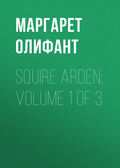
Маргарет Олифант
A Country Gentleman and his Family
Her tone had changed. From the anxiety to soften and smooth everything, the constant strain of deprecation and apology which had become habitual to her, she had suddenly emerged into a composure which was ominous, which was almost tragic. Even the act of sitting down, which was due to her weakness, made her appear as if taking a high position, assuming an almost judicial place. She did not intend it so, but this was the effect it produced upon Warrender, stinging him more deeply still. He felt that he was judged, that his wife had thrown off the yoke which he had made so heavy, and that his chance of bringing her back to her subjection, and of forcing her into the new and sudden decision which he called for, was small. This conviction increased his fury, but it also made him restrain the outward signs of it. He went after her, and stood in front of the bench of which she had made a sort of judicial throne.
"You are right in that," he said. "Things have gone too far to return to their old level. I must have my house to myself, and for that reason it must be my own. I wish you to come with me to the Warren, – the children and you."
"Your mother and your sisters are there," she said, fixing upon him a steady look.
"What does that matter? There is room, I hope, at all times for the master of the house."
"You ask me," she said, "to turn all my life upside down, to change my habits and arrangements, at a moment's notice. But you have not told me why. Have you told me? You have said that my little boy of twelve has offended you, and that you knocked him down. Is that why I must change my house, and all my life?"
The slow steadiness of her tone made him frantic; that, more than the deliberate way in which she was putting him in the wrong.
"I have told you," he cried, "that I am in a false position altogether, and that I will not bear it any longer! You ought to see that I am in a false position. As for your little boy – of twelve – "
"What of him?" she asked, growing very pale, and rising again from her seat.
"Only this one thing, Frances: that you can't serve God and mammon, you know; you can't keep both. You must choose between him and me."
"Choose!" She sat down again suddenly, as if her strength had failed her. "Choose! between Geoff, my little Geoff – my boy – my baby – Geoff – "
There was a kind of ridicule in her voice, a ridicule which was tragic, which was full of passion, which sounded like a scoff at something preposterous, as well as an indignant protest.
"Your scorn does not make it different. Yes, Geoff, who is all that: and me – between him and me."
For a moment they gazed at each other, having arrived at that decisive point, in a duel of the kind, when neither antagonist can find a word more to say. Lady Markland was very pale. She had been brought in a moment from her ease and quiet, when she expected no harm, to what might be the most momentous decision. She was still feeble, her nerves strained and weak from the long tension at which they had been held. She had clasped her hands together, and the fingers quivered. Her eyes seemed to grow larger and more luminous as she looked at him. "Theo," she said with a long breath. "Theo! do you know – what you are saying? Do you mean – all that – all that?"
He thought he was going to get an easy, an unlooked-for victory; he congratulated himself with a swift flash of premature triumph that he had pushed matters to a crisis, that he had been so firm. "Yes," he cried, "I mean it all! We can't go on longer as we are. You must choose between him and me."
She kept looking at him, still without relaxing from that fixed gaze. "Do you know what you are asking?" she said again. "That I should give up my child, – my first-born child, my little delicate boy, who has never been parted from me. Was it ever heard of that a mother was asked to give up her child?"
"They have done it," he said, – "you must know that, – when a higher claim came in."
"Is there any higher claim? Every other is at our own choice, but this is nature. God made it. It cannot change. There may be other – other" – she faltered, her voice grew choked, – "but only one mother," she said.
"Other – other?" he cried. "What? To me there has been but one, as you know. I have put all my chances in one. God made it? Has not God made you and me one? – whom God has joined together – "
"Oh, Theo." She got up and came towards him, holding out her hands. "One, to bear each other's burdens, to help each other; not to go against nature, to abandon what is the first of duties. Theo! oh, help me; do not make it impossible, do not rend me in two! What can I say to you? Theo!" She tottered in her weakness; her limbs were not strong enough to support her. But Warrender made no forward step. He did not take the hands she held out to him. He had to be firm. It was now or never, he said to himself.
"If we are ever to live happily together the sacrifice must be made. I don't want to hurt you, Frances. If I seem harsh, it is for our good, the good of both of us. Make up your mind. Can any one doubt what is your first duty? It is to me. It is I that must settle what our life is to be. It is you who must yield and obey. Are you not my wife? Spare yourself farther pain, and me," he went on, with all the absolute and cruel sincerity of youth. He made it up in his own mind that this was the right thing to do, and steeled himself to resist the appeal of her weakness, to see her flutter back to the hard bench, and drop down there, unsupported, unaided. It was for the best, it was for her good, to put things on a right footing at once and for always. After this, never a harsh word, never an opposition, more.
Her husband thus having her to himself, standing before her, magisterial, coldly setting down what her duty was, enforcing obedience, – he who little more than a year ago – She wavered back to her bare seat alone, and sat there, looking up at him till his peroration came to an end. In these few minutes many things flew through Lady Markland's thoughts, – unspeakable offence, revolt against the unlovely duty presented to her, a sudden fierce indignation against him who had thus thrust himself into her life and claimed to command it. At that moment, after all the agitation he had made her suffer, and before the sacrifice he thus demanded of her, she could scarcely believe that she too had loved him, that she had been happy in his love. It seemed to her that he had forced himself upon her, taken advantage of her loneliness, compelled her to put herself in his power. It had been all adoration, boundless devotion, help, and service. And now it was command. Oh, had he but said this before! Had he bidden her then choose between her child and him, before – And as she looked at him a wild ridicule added itself to these other thoughts. To see him standing making his speech, thinking he could coerce like that a woman like herself, thinking in his youthfulness that he could sway any woman's heart like that, and cut off the ties that vexed him, and settle everything for the good of both! Heaven! to see him lifting up his authoritative head, making his decision, expecting her to obey! Spare yourself, and me! That she should refuse did not enter into his mind. She might struggle for a time, but to what use? Spare yourself, and me! She could not help a faint smile, painful enough, bitter enough, curving her lips.
"You speak at your ease," she cried, when his voice stopped. "It is easy to make up your mind for another. What if I should refuse – to obey, as you say? A wife's obedience, since you appeal to that, is not like a servant's obedience or a child's. It must be within reason and within nature. Suppose that I should refuse."
He had grown cool and calm in the force of his authority. The crimson flushed to his face and the fire to his eye at her words. "Refuse – and I have my alternative!" he cried. "I will never enter your house again nor interfere in your concerns more."
Again they contemplated each other in a deadly pause, like antagonists before they close for the last struggle. Then Lady Markland spoke.
"Theo, I have done all that a woman could do to please you, and satisfy you, – all, and more than all. I will not desert my little boy."
"You prefer Geoff to me?"
"There is no preferring; it is altogether different. I will not give up my child."
"Then you give up your husband?"
They looked at each other again, – she deadly pale, he crimson with passion, both quivering with the strain of this struggle; her eyes mutely refusing to yield, accepting the alternative, though she said no more. And not another word was said. He turned on his heel, and walked back down the avenue, with quick, swinging steps, without ever turning his head. She watched him till he was out of sight, till he was out of hearing, till the gate swung behind him, and he was gone. She did not know how she was to get back to the house, over that long stretch of road, without any one to help her, and thought with a sickening and failing of her heart of the long way. But in this great, sudden, unlooked-for revolution of her life she felt no weakness nor failing. The revulsion was all the greater after the long self-restraint. For the first time after so long an interval she was again herself.
CHAPTER LII
That night Lady Markland did not close her eyes. The strength of resistance, of indignation, of self-assertion, failed her, as was inevitable in the long and slow hours, during which she looked out, at first with a certainty, then with a hope, that Theo would come back. He must come back, she said to herself, even if all were over, which seemed impossible, impossible! – all in an hour or two, in one afternoon, when she thought no evil. Still the most prosaic of considerations, the least important, his clothes, if nothing more, must bring him back. She went on saying this to herself, till from a half scorn which was in it at first it came to a kind of despair. He must come back, at all events, for his clothes! She could scarcely bear Geoff all the afternoon, though it was for him all this misery was. She never could, nor would, give up her child: but his society was intolerable to her for the moment; and she felt that if Theo came and found them together he might think – he would have a certain right to think. It was a relief to her when at last Geoff went to bed, silenced in all his questions, chilled, terrified, yet still heroically restraining himself, and making up his mind that he was to be sent away. After this she felt a kind of relief, a freedom in being left to herself, in wandering about the rooms and looking out in succession at every window that commanded the avenue. When the hour came to shut up the house she gave the butler an elaborate explanation; how Mr. Warrender had been obliged to return to the Warren about some business, how it was possible that he might not come back that night; in fact, she did not expect him that night, but still he might return. It was not necessary that any one should sit up, oh no, not necessary at all. She would hear him if he came, or he could let himself in. "But I really do not expect him to-night. He has – business," she said, with a smile, which the butler thought not at all like my lady. She was not given to explanations in an ordinary way. She was very kind and considerate; but she was always a great lady, and not expansive to her servants. She smiled in a strange conciliatory way, as if begging him to believe her, and explained, to make it all right. The butler was not deceived. When was any butler ever deceived by such pretences? He knew better, – he knew that something had happened. He told the company downstairs that he made no doubt there had been a row, and most likely about Master Geoff, and that they might make up their minds to see rare changes. They were all making their comments upon this in the servants' hall, while Lady Markland, standing at the window, looked out with a sort of desperation, shaping the figure of Theo a hundred times in the distance, scarcely able to restrain the impulse to go out and look for him; saying to herself, no longer scornfully, but with the profoundest tragic gravity, that he must come back, if only for his clothes! It was a dim summer night, the sky veiled with clouds, and after midnight fitfully lit by the gleam of a waning moon. She went from window to window noiselessly, thinking that now one, now another, had the most perfect command of the avenue; hearing a hundred sounds of footsteps, even of distant wheels and horses' hoofs, which seemed to beat upon the ground far off, and never came to anything; then when the dawn began to be blue in the sky, threw herself upon her bed and hid her face, knowing that all was over, and that he would come back no more.
Scarcely less was the consternation in the Warren when Theo, pale and silent, wrapped in silence as in a cloak, making no reply to the questions asked, ordering his old room to be made ready without any explanation, came back to the already excited house. Dick and Chatty and all their affairs were forgotten in the extraordinary new event. "Oh, Theo, what has happened," Mrs. Warrender cried, "what has happened? Are you not going home?"
"This is my home, I suppose," he said, "unless you have any objections," which closed her mouth. She thought there must have been a quarrel, and that Lady Markland had resented Theo's treatment of Geoff, which his mother immediately began to justify to herself; saying that of course he did not mean to hurt the child, but that a person put in charge of the children of another, in any case, must have some power of correcting them when they wanted correction, and with great wonder and indignation at his wife had yet a wondering question in her mind – what would she herself have done if any one had corrected Theo so when he was a boy? She did all she could to urge him to return, sitting up till very late, keeping the groom awake for possible orders. "Frances will be very anxious," she said to her son. "She has no reason to be anxious; she knows where I am." "Oh, Theo, don't let it come to a quarrel," Mrs. Warrender urged imploringly, with tears in her eyes. Her attitude put him in mind of his wife's attitude as she stood holding out her hands, and was intolerable to him. "Good-night, mother. I am going to bed," he said. Mrs. Warrender was as restless as Lady Markland. She had come and listened to his breathing outside his door, and seen that his light was out, and that he had actually gone to bed, as he said, before she would allow herself to be convinced. It was a quarrel, then; and what was to come of it, – what was to come of it? Lady Markland was very yielding and gentle, but Theo! Theo was not yielding. Mrs. Warrender, too, lay down when it was nearly morning, as miserable as could be.
And yet none of them, not even the chief actors, who were both at the pitch of desperation, really believed that what this meant was a breach which should last for years. Even they would not have believed it had it been put to them. That it should not all come right was incredible. But as a matter of fact it did not come right. Lady Markland was not by nature the yielding and anxious woman whom for this year of troubled wedlock she had appeared; and everybody knew that Theo was neither persuadable nor reasonable, but had the hottest temper, the most rigid will, of his own, and that ingenuity in finding himself in the right which gives a fatal character to every quarrel. Lady Markland was willing to make any concession but the one which he required, the abandonment of Geoff. But he would make no concession; he stood upon his rights. With all the fervour and absolutism of inexperience he stood fast. No, nothing less than everything, nothing but entire submission, nothing but obedience. Alarmed and anxious friends gathered to the fray, as was inevitable, and everything was made worse. The result was that within a few weeks Theo Warrender had gone off with a burning sense of injury and wrong, to travel he did not much care where, to forget himself he did not much care how; and Lady Markland, feeling as if she had awakened suddenly from a strange dream, a dream full of fever and unrest, of fugitive happiness but lasting trouble, came to herself all alone with the two little babies, in a strange solitude which was no longer natural, and with Geoff. She had chosen, who could say wrongly? – and yet in a way which set wrong all the circumstances of her life.
This was how for the moment her second venture came to an end. Theo went forth upon the world for that Wanderyear in which so much of the superfluous vigour of life is so often expended, which it would have been so well for everybody he had taken before: and stormed about the world for a time, no one knowing what volcanoes were exploding in his soul. How much he gathered of better wisdom it is not within the limits of this history to say.
The happy ones were Dick and Chatty, who began their life together as if there had been no cloud upon it. He had fully lived out his Wanderyear, and had paid dearly for the follies, which had been done with no evil meaning on his part, but in all honour and good intention, bitterly foolish though they were. And perhaps he never was very wise, nor rose above the possibility of being taken in, which is a peculiarity of many generous spirits. But why should we say they were the happy ones? The really happy ones were Minnie and her Eustace, who never felt themselves to be in the wrong, or were anything less than the regulators of everybody's life and manners wherever they went. It was Mrs. Eustace Thynne's conviction to the last that all the misfortunes which temporarily befell her sister were owing to the fact that she herself was not on the spot to regulate affairs; and that Theo, if he had taken her advice, would never have placed himself in the way of the trouble which had overwhelmed his life.







